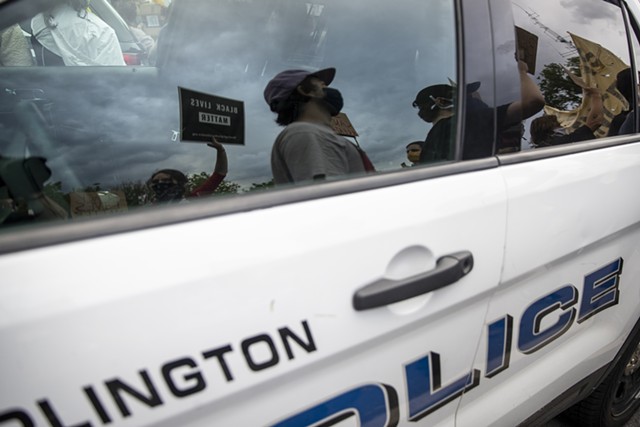
- File: James Buck ©️ Seven Days
- Demonstrators passing a police car in Burlington
Despite opposition from his administration’s top public safety official, Gov. Phil Scott has announced that he will not veto a bill that establishes statewide standards for the use of deadly force but will instead allow it to become law without his signature.
Scott revealed his decision Wednesday night, writing in a letter to lawmakers that he hopes they will take more testimony from “all impacted communities” and improve the bill before it goes into effect on July 1, 2021.
This year has served as a reminder that systemic racism is “deeply rooted in our nation’s institutions," Scott wrote, adding that although Vermont has recently passed other police reform measures, it is not immune from instances of racial discrimination and disproportionate use of force witnessed around the country.
“We must do more,” Scott wrote.
The bill,
S.119, was initially proposed last year but was given new life amid the public reckoning brought on by the police killing of George Floyd.
It will place Vermont’s roughly 70 law enforcement agencies under a uniform deadly use-of-force policy, replacing the patchwork of local ones that have been shaped by various court decisions, local governments and national experts over the years.
The new law will require officers to consider factors such as language barriers or mental impairment when deciding whether to use force. It will also ban "prohibited restraints" such as choke holds under most circumstances and will evaluate after the fact whether officers’ use of force was based on "the totality of circumstances" not just the moments before it occurred.
The American Civil Liberties Union of Vermont praised Scott's decision in a press release on Wednesday night, saying the new law is a "historic milestone" that gives Vermont the "best statewide police use of force standard in the nation."
"We thank the governor and the legislature for their leadership, and for listening to Vermonters who are saying loud and clear that transformational change is badly needed," ACLU of Vermont executive director James Lyall said in the release.
But while supporters of the measure believe it will save lives by encouraging de-escalation tactics, some law enforcement leaders — including Scott's public safety commissioner, Michael Schirling — have warned that it could
take years for courts to interpret the new language.
"It will do the opposite of what we're trying to achieve, which is clarity and consistency and accountability," Schirling said last month during a Senate committee hearing. "It will create ambiguity, confusion and not lead to consistent outcomes, because we literally will not know how to interpret it for years."
Scott acknowledged these concerns in his letter on Wednesday night. He argued that the hasty process to craft the bill during last month’s budget session provided “insufficient opportunity” for lawmakers to understand the concerns of Vermont’s communities of color and public safety officials.
And referencing law enforcement officers who are frustrated that the bill passed without proper consideration of the “time and resources” that will be needed for training, Scott wrote: “I hear those concerns, and — again — I ask lawmakers to work with me to improve this bill in January."
Scott also announced on Wednesday that he was signing two less controversial measures aimed at reforming police departments and furthering racial justice:
S.124, which enacts changes to police policies and training, and
S.24, which seeks to address inequities in the prison system.
The first law will require police agencies that are considering hiring an officer from another department to request their performance reviews. It also adds civilian members to the Criminal Justice Training Council, including a mental health crisis worker and person chosen by the NAACP, and instructs the panel to explore and propose policies covering the use of body cameras and footage, access to surplus military equipment, and facial recognition technology.
The corrections law will compel the Department of Corrections to come up with a plan to “address systemic racism, bias, and diversity and inclusion” in the department and deliver a report to the legislature by January 15, 2021.


















Comments
Comments are closed.
From 2014-2020, Seven Days allowed readers to comment on all stories posted on our website. While we've appreciated the suggestions and insights, right now Seven Days is prioritizing our core mission — producing high-quality, responsible local journalism — over moderating online debates between readers.
To criticize, correct or praise our reporting, please send us a letter to the editor or send us a tip. We’ll check it out and report the results.
Online comments may return when we have better tech tools for managing them. Thanks for reading.